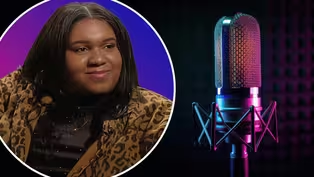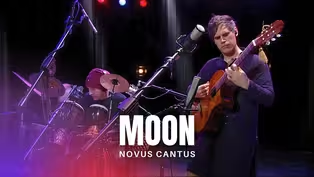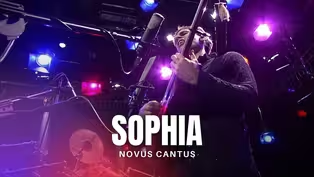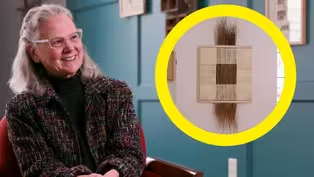
Voice Acting 101: Tips, Challenges, and Inspiration
Clip: Season 10 Episode 14 | 9m 51sVideo has Closed Captions
Learn more about Nicole DamaPoleto's journey and get some voice-acting tips.
Nicole DamaPoleto always wanted to be a voice actor, and five years ago she took steps to make her dream a reality. Jade Warrick sat down with Nicole to learn more about her journey and to get some voice-acting tips.
Problems playing video? | Closed Captioning Feedback
Problems playing video? | Closed Captioning Feedback
AHA! A House for Arts is a local public television program presented by WMHT
Support provided by the New York State Council on the Arts (NYSCA), M&T Bank, the Leo Cox Beach Philanthropic Foundation, and is also provided by contributors to the WMHT Venture...

Voice Acting 101: Tips, Challenges, and Inspiration
Clip: Season 10 Episode 14 | 9m 51sVideo has Closed Captions
Nicole DamaPoleto always wanted to be a voice actor, and five years ago she took steps to make her dream a reality. Jade Warrick sat down with Nicole to learn more about her journey and to get some voice-acting tips.
Problems playing video? | Closed Captioning Feedback
How to Watch AHA! A House for Arts
AHA! A House for Arts is available to stream on pbs.org and the free PBS App, available on iPhone, Apple TV, Android TV, Android smartphones, Amazon Fire TV, Amazon Fire Tablet, Roku, Samsung Smart TV, and Vizio.
Providing Support for PBS.org
Learn Moreabout PBS online sponsorshipSo to begin, I wanna ask, what is your origin story with voice acting?
Like how did you get into this field?
- So I've loved it since I was a little girl, and it started with, I grew up with my grandparents and my mom, and my grandpa would always listen to Louis Armstrong, and I would like mimic it for him.
I'd be like, it don't mean a thing, and he would laugh, and I was like, oh, this is really fun.
I love this.
And in elementary school they did a performance outside, and they let me be the voice of the color green.
And I just, I loved it.
It's so fun, and it's very versatile.
And during the pandemic, like everyone, I reflected on life, and I went for it.
I just sought out community and found classes and folks from all over the country, and I've jumped in.
It's very fun.
- That was a big thing during Covid I've noticed.
It was actually ironically a growing spurt for a lot of artists because we had nothing to do but focus on our art.
So that's a beautiful, a beautiful origin story.
So in your opinion, what makes a great voice actor and why is diversity and authenticity important to this field?
- Two very good questions.
- Right?
- A good voice actor has to be disciplined because many times, like other artists, you're isolated.
I think that many people like myself when I jumped in and was like you're gonna be going to a studio, but I've heard of voice actors being like, oh, I'm in a hotel under a laundry basket trying to get an audition in right now while on vacation with my family.
So you have to be able to keep to it.
There's a lot of auditions and a lot of rejection.
So there's discipline, but also being coachable because you're gonna get a lot of feedback, and if you can't necessarily take that feedback, it's gonna hurt you from growing.
And be willing to have fun.
Because many times I've been in a closet trying to audition for like a chocolate, a little chocolate commercial, and I'm just like, in between meetings or something, I'm like, I have to get excited.
You have to be excited.
And one of the great things a coach told me is like talk like you're talking to your best friend.
How would you say this to your best friend?
You're like, you would wanna eat this chocolate.
Like, but you wouldn't say it like you want eat this chocolate.
That's just.
- Yeah.
- Be willing to have fun.
Yeah, that's a big one.
And then you asked about diversity - And authenticity.
Like why is that important to the field?
- Oh, oh my goodness.
I'll say that a lot of people have not been able to tell their stories, and they should get to voice their stories.
They should get to voice, someone who's truly there.
And many times in the past, even with the best of intentions, if someone is voicing someone who's not their culture, their identity, it can come across with stereotypes and mockery.
And it doesn't make people feel good, but even with the best of intentions.
But it's really important for people to be able to tell their own story, and for people who have that identity to share it because also a thing in voiceover is they want you to be yourself, speak as yourself.
You're not speaking as someone else sometimes.
I mean, depending if you're doing medical narration or something or you're talking as like an ogre, but you should be speaking with your natural tone because many times they're gonna ask can you do this for three hours?
Can you talk in a grated voice for three hours?
Can you talk like this for three hours?
You have to be able to be consistent.
So if it's not you, authenticity, it's gonna waver.
- It's gonna waver.
- [Nicole] Yeah.
- And I like how you mentioned, you said, I think voiceover is medical.
So what are all the, I don't know if a lot of people understand how broad voice acting is.
You know, when I think of voice acting, I think of things that I play games, and I watch cartoons, but there are so many varying, I guess, fields, and I guess a spectrum.
So what are some like, I guess, could you explain that to us a little bit?
Like what is the spectrum of voice acting?
- Oh my goodness.
When I learned how much you could do, I realized that's why people are so welcoming in the voiceover community because there's a space for everybody.
- Mm.
- If you're interested in romance books, you can go down that lane.
If you are interested in accessibility or you have a disability background, you could do audio description for movies.
If you have a medical background, you could do medical narration and training videos.
I mean, think about in your daily life when you hear voiceover in the car, public transportation, at work.
I mean, I mean ultimately, you know, you want to get to the cartoons or.
- Yeah, - I wanna, that's really fun, the movie stuff.
But there's so many different routes that people can take in voiceover.
I mean, besides any kind of book, but podcasting, this and that.
It's just, it's very rich in opportunities for people.
And I had no idea.
It's very cool.
- Yeah, that is awesome.
- [Nicole] Yeah.
- So I know voice acting is very similar to traditional acting.
Lots of auditions, lots of rejections, lots of auditions, lots of rejections.
- Yes.
- It can be kind of a whirly-dorly kind of art field.
So how do you get yourself through those challenges and some of the stressors that come with that?
Because it has to be challenging.
- Yeah, I've actually, that's interesting you say that.
'cause I feel like I'm in a, not to say a break right now, but like you do get a lot of nos before you get a yes.
And you do have to keep putting yourself out there and hoping that you're gonna connect or find the right route.
But it's just, you have to keep believing in yourself and also have good coaches to be like, okay, like let's find where you're aligned.
Let's find something that really works for you.
Because you might be like, I really wanna do cartoons or video games.
But you might find, oh, okay, I actually really wanna be an audiobook narrator because it is smooth, and you can also market directly to authors that you like that have interest in, but you just gotta keep going.
- Yeah.
- Because many times voice actors will be like, oh, I've been in this for 10 years, and I just got a video, my first video game.
- Wow.
- Like major video game.
I mean, there are smaller studios and whatnot and lots of opportunities, but it's an investment financially, and it's an investment of your time and creativeness.
So you have to fill your own cup.
You have to stay disciplined to yourself.
And many times you'll be like, am I actually a voice actor if I'm not landing things?
But think about the actors that you know that they're not necessarily in a movie, but they're still an actor.
- Yeah.
- You're not necessarily in a play right now, but you're still an actor, and you have to remind yourself that, yes, no, I'm not the voice of Cheerios.
No, I'm not the voice of A, B, and C, but I'm still a voice actor.
I can still share.
- Yes, oh, that's beautiful.
I love that.
Now here's the controversial statement.
- Okay, here we go.
- AI, I know artists either hate AI or they love AI.
There's usually, I've not really heard a in between.
So what are your thoughts on AI and its impact on the voice acting community?
And is it a negative and why?
- AI, I mean, it's going to be a part of our lives forever.
I mean it's, I don't think I realized that AI's been a part of my life.
I use Siri all the time.
- That's true.
- And I've used AI to edit materials at work like for my communications job.
But you don't have any rights as an American to your voice and your likeness.
- Mm.
- And so there's an association called the National Association of Voice Actors, NAVA, that's working to fight that, the No Fakes Act.
But for me it's really tough because I saw all those cool AI pictures that people did of their profile pictures, and I was like, this is really cool.
But I also have a lot of friends who are artists who would love those commissions, who would love to support.
So I couldn't do it because I was like, why would I pay when I could pay someone else who's working on this?
And I've seen other colleagues like use fake voices, and I'm like, I could help you.
Is it really gonna convey the actual emotion that you want?
- Yeah.
- No, and I mean, I personally, I don't want AI voices used, and I don't want, because my name and my likeness is used, I don't want someone to put a couple of my videos into some kind of software and then mimic my voice to say things.
- Yeah.
- It's just very dangerous and scary.
But I know it's gonna be a part of our lives - At the end of the interview, I wanna ask you, what is the most rewarding part of your voice artist journey so far?
What brings you the joy the most about this?
- Honoring little me.
- Yeah.
- Little me loved voice acting and loved pretend, and didn't have a lot of opportunities.
I grew up in like a very small town, and I feel like I'm honoring her and things she enjoyed because I work for a nonprofit, and it's great, and I'm passionate about it, but I feel like this is fun.
And also honoring those, the questions of what do you wanna be when you grow up?
What could you be if you couldn't fail?
And it's fun.
- Yeah.
- Like I found a lot of joy in doing this 'cause you can try different things, and if it doesn't make it, it doesn't make it, but you tried something different.
You can try on a new personality or a new voice.
It's a really fun thing, yeah.
- Yeah, that's awesome Nicole.
Well, thank you for joining us today.
I hope folks can learn more about this beautiful art form of voice acting.
And thank you again for being here.
- Thank you for having me.
Breaking into the Voice Acting Industry: Preview
Preview: S10 Ep14 | 30s | Nicole DamaPoleto, Leslie Yolen, and Novus Cantus. (30s)
Video has Closed Captions
Clip: S10 Ep14 | 4m 25s | Enjoy a captivating performance by the unique world rock band, Novus Cantus. (4m 25s)
Novus Cantus Performs "Sophia"
Video has Closed Captions
Clip: S10 Ep14 | 4m 28s | Enjoy a captivating performance by the unique world rock band, Novus Cantus. (4m 28s)
Sculpting Stories: Leslie Yolen’s Artistic Evolution in Clay & Wax
Video has Closed Captions
Clip: S10 Ep14 | 5m 27s | Leslie Yolen explores clay, wax, and mixed media, crafting art that reflects life’s impermanence and (5m 27s)
Providing Support for PBS.org
Learn Moreabout PBS online sponsorship

- Arts and Music
The Best of the Joy of Painting with Bob Ross
A pop icon, Bob Ross offers soothing words of wisdom as he paints captivating landscapes.












Support for PBS provided by:
AHA! A House for Arts is a local public television program presented by WMHT
Support provided by the New York State Council on the Arts (NYSCA), M&T Bank, the Leo Cox Beach Philanthropic Foundation, and is also provided by contributors to the WMHT Venture...




